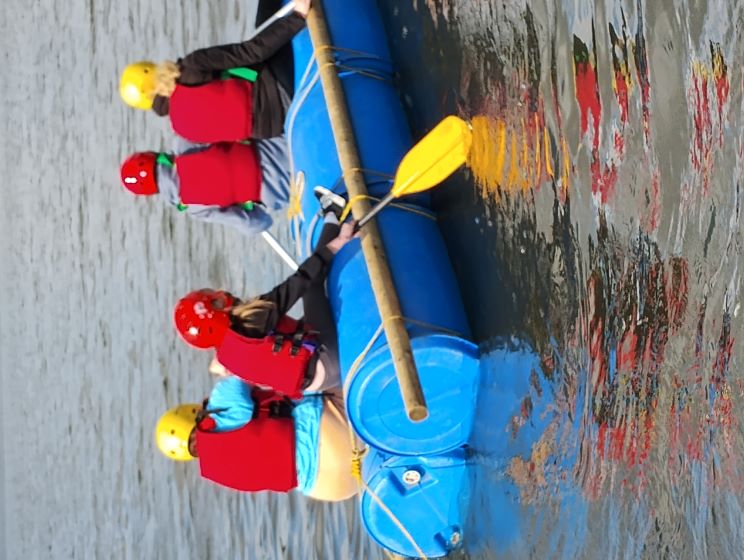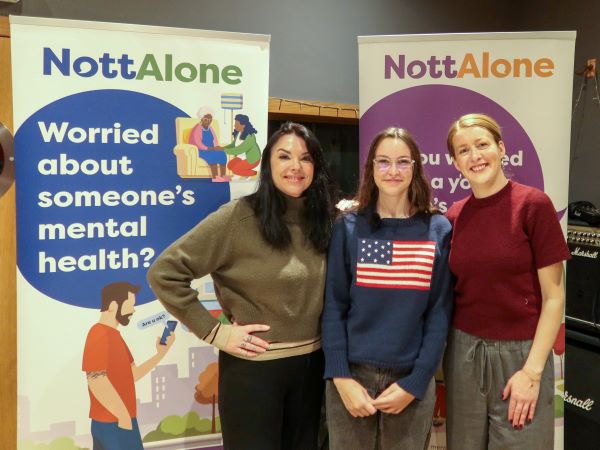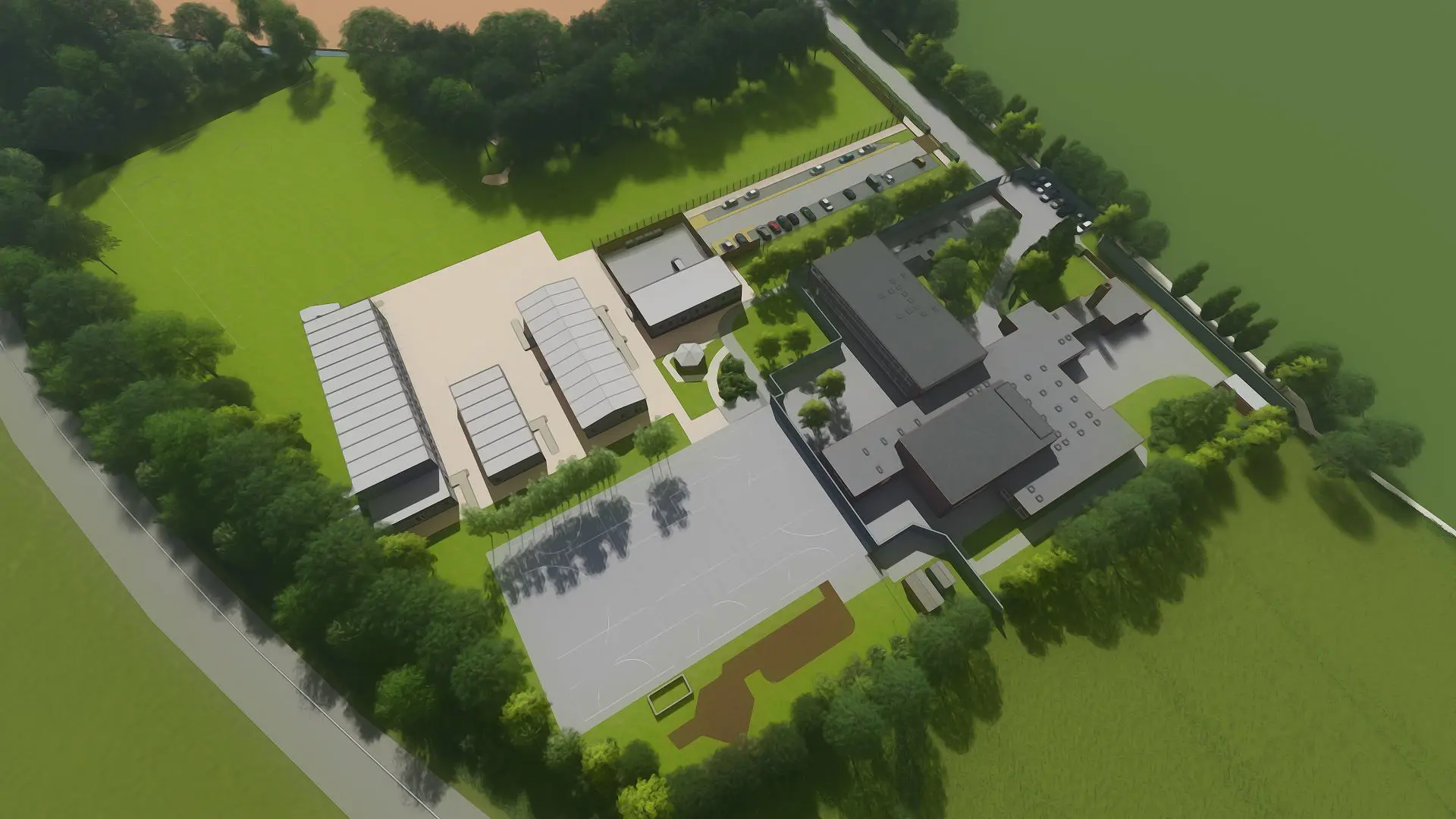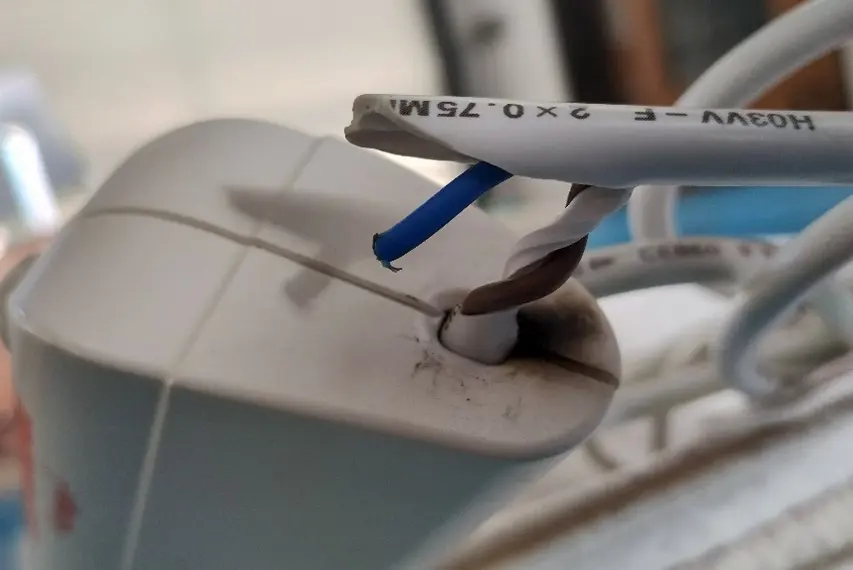Examples
Below are examples of participation activities and the difference they are making for children, young people and families in Nottinghamshire. If you have an example of the difference participation has made that you’d like us to publish, please email cfsstrengthsbasedpractice@nottscc.gov.uk
Local mental health support for young people through Retford Family Hub Network
Consultation and co-production have been at the heart of the development of family hubs in Nottinghamshire. The first to be created is Retford Family Hub which opened as a design site in 2023. As part of the design, young people and families were asked whether they wanted a family hub, and if so, what services they’d like to be available. One of the things they told us is the need for emotional health and wellbeing services to be more accessible locally, including one-to-one mental health support for young people.
Families told us that travel is a barrier to them accessing these services in Retford and that issues with transport potentially impact on waiting times to be able to start getting support. Young people told us that they wanted to feel comfortable with their therapy environment (safe, confidential, and not too clinical), and for family members to have a waiting area and parking close by.
As a result, Talkzone, a counselling and mental health service providing free, confidential support to children and young people, aged 11-25, across Bassetlaw was invited to provide appointments to young people in Retford at the town’s family hub.
What difference has local access to counselling made to children and families in Retford?
Having Talkzone’s services available in the family hub has been crucial in making sure young people and their families have access to counselling.
The time a young person waits to see a counsellor has reduced because their individual needs can be met more locally. They can spend more time in school because of not needing to take so much time out to travel. Being in a community space, rather than a clinical setting, has helped young people to feel more comfortable, and helped them to see it as a therapeutic space where, with time and support, positive change can happen.
- 96% of young people who accessed Talkzone in Retford felt more able to deal with challenges on their own.
- 98% of young people said that accessing support from Talkzone had helped them overcome their problems to some degree.
- 98% of young people said that they felt the risk of their situation reaching crisis point had reduced because of Talkzone support.
- A high percentage of young people require no further professional support when their counselling comes to an end.
In their own words:
“I found it really useful to have a safe space to work through my worries and it was eye-opening to explore ways to manage/overcome these”.
“Really good support. Helped me feel more confident and believe in myself. Helped me deal with my worries and anxiety a great deal”.
“It did become a safe zone for me to talk clearly”.
“My worker made me feel extremely comfortable and listened too. The appointments have helped a lot with my mental health and how to cope”.
What next?
Following the successful pilot of Retford Family Hub, it opened permanently at a launch in July 2024. Following a pause on Talkzone counselling at Retford Family Hub, sessions return on Tuesday 23 July 2024. Co-production will continue to be at the heart of the development of Retford and other family hubs across Nottinghamshire.
Contact: Annette.tutalo2@nottscc.gov.uk Retford Family Hub
Activity days for children and young people
We are committed to ensuring that children, young people, parents, carers and kinship families with experience of children's social care have a voice in shaping the support services provided.
To achieve this, the Strengths-based Practice Team and social care staff have organised activity days and coffee mornings designed to gather feedback and foster positive relationships between social workers, children, and families.
Since November 2023, seven activity days have been held across Nottinghamshire, with approximately 168 children and young people aged 5 to 15 participating alongside their social workers. In 2025 we extended these to offer to our kinship families, hosting two dedicated activity days specifically for them. These events offered a range of engaging activities, including:
- Biscuit decorating and cookie baking
- Crafting - dream catchers, lavender bags, keyrings, and friendship bracelets
- Outdoor adventures like climbing, building rafts and shelters
- Planting seeds
- Playing games and enjoying shared meals

Beyond simply providing enjoyment, these activities created opportunities for children to share their thoughts and feelings about having a social worker and the support they and their families receive. The informal setting helped reduce shame and stigma often associated with social care involvement. Children expressed the importance of having a social worker who embodies qualities like trust, kindness, and active listening. They also emphasised their right to feel safe, have their needs met, and receive help when facing challenges.
Coffee mornings for parents and carers
Recognising the importance of parental perspectives, coffee mornings were held for parents and carers of children who attended the activity days. These gatherings provided a space for parents to connect, share their experiences, and offer feedback about the activity days and their overall experience with social services.
View the 'Coffee Mornings' poster [PDF]
Parents reported several positive outcomes from the activity days, including:
- Increased pride in their children's achievements
- A sense of respite and a break from daily routines
- Confidence in their children's safety and well-being while with their social workers
- Appreciation for the opportunity for their children to engage in activities they might not otherwise experience
Impact and Benefits
The activity days and coffee mornings have proved to be a successful approach to gathering valuable feedback and strengthening relationships between social workers, children, and families.
For children and young people:
- Increased confidence and enjoyment
- A sense of pride in their accomplishments
- Enhanced trust and stronger relationships with their social workers
- Realisation that they are not alone in having a social worker
- A platform to express their views and be heard
For parents and carers:
- Pride in their children's positive behaviour and engagement
- Strengthened relationships with their social workers
- Observation of their children's increased confidence and resilience
- Gratitude for the unique and enriching experiences provided for their children
For social workers:
- Deepened relationships with the children and families they support
- More open and trusting communication with families
- Valuable insights into family dynamics and individual needs through informal observation
- Enhanced assessments and planning based on richer information


Looking ahead
Given the positive feedback and impact of the activity days and coffee mornings, we are planning more activity days and coffee mornings in 2026. We are also exploring other ways to engage with children, young people, parents, and carers to ensure their voices continue to shape and improve the support services provided. The goal is to create a collaborative environment where everyone feels heard, respected, and empowered to contribute to positive change.
The Outstanding Achievement 4Uth awards, launched in 2012, celebrates young individuals from Nottinghamshire who have made a positive impact on their communities. The awards aim to honour young people who have overcome significant challenges and achieved great things for themselves, their families, or their communities. Every year, young people aged 11 to 25 are nominated for these awards by their friends, family, teachers, youth workers, and other support workers.
How are young people selected?
Each district in Nottinghamshire shortlists three nominees and selects their own district winner. There are seven winners in total, one from each district, with the county-wide winner announced at the annual award ceremony. The most recent winner, Archie Matthews from Broxtowe, was recognised for his exceptional volunteering in his local community.
What difference do the 4Uth awards make?
The 4Uth winners have made significant contributions, such as setting up groups for care-experienced young people, advocating for children across the care system, and promoting recycling in their communities. They have also been seen as role models and inspirations for other young people.
The 2025 winner, Archie, creates a welcoming space supporting at his local youth club and volunteers with St John’s Ambulance, including helping to train peers and supporting at events. Archie also serves as a regional representative and Lord Lieutenant’s cadet. Praised for his community impact, Archie said winning felt “incredible”. His nominator youth worker Paul Bailey said he is the most deserving.
What next?
Plans are underway for 4Uth awards 2026 – the Youth Service is currently in consultation with some of the young people involved last year about how we can continue to develop the process and the celebration event.
What is Youth Voice?
The Youth Justice Service has a ‘Child First’ approach which means that they put children and young people at the centre of everything they do and recognise the importance of young people’s voices. To understand their experiences and make effective improvements, they have formed a group called ‘Youth Voice’, made up of young people involved with the service from across the County. The group meets every six weeks to discuss various topics and share their experiences.
What topics have Youth Voice been involved with?
Recently, the group discussed the ‘journey of the child’ through the Youth Justice Service, particularly focusing on those involved with the service for the first time. They explored changes the service could make to enhance the initial support experience for young people.
What difference has Youth Voice made?
The feedback from Youth Voice has directly influenced how the service supports young people. Now, all children receive a copy of their plan, clear explanations about their orders, and a completion letter when their support ends. This letter acknowledges their achievements and the completion of their order. New policies and procedures ensure a consistent experience for all young people. Additionally, Youth Voice members have developed new friendships and grown more confident.
What next?
The Youth Justice Service will continue to support young people in voicing their experiences to help improve other services within the Youth Justice system, such as the Nottinghamshire Police. Regular meetings with children and young people will continue, and their views will be shared at Youth Justice Board meetings.
Contacts:
- Hedley Sansom Hedley.sansom@nottscc.gov.uk
- Mohammed Yaseen Mohammed.yaseen@nottscc.gov.uk
Introducing Janie and her Pathway Plan
Janie* is 16 years old and recently co-produced an image-based pathway plan with her social worker, Clare. A pathway plan is a document that prepares a young person for leaving care to ensure they get the right support to confidently live independently. Janie moved to a home with foster carers when she was five years old. Janie had experienced significant trauma and, more recently, bereavement. She has significant emotional and mental health needs, including anxiety and depression with features of post-traumatic stress disorder. Janie currently lives in a specialist home to make sure she gets the mental health support she needs.
How did Janie create her Pathway Plan?
Understanding the need for a creative, positive, and strengths-based approach to engage Janie meaningfully, Clare chose to work with Janie to create her own version of the plan, so she could better understand the standard text version that had to be completed. They created a Microsoft PowerPoint version that featured photographs and illustrations and linked with her placement plan. This process allowed them to review Janie’s achievements, such as completing Functional Skills level 1 in science and English and reducing her risk level at home. Janie was able to identify her own goals, including living independently and going for a horse ride every week, and they developed a plan to achieve these goals.
What difference has this made?
The co-productive and strengths-based approach to creating her Pathway Plan has had a significant impact on Janie’s self-esteem. She feels included, important, and in control of her life. She knows that the people in her support network believe in her capabilities and see her progress. Janie is very proud of her version of her Pathway Plan. She has printed it out and put it up in her room, and she always carries another copy. This has helped her to remember her plan better and she refers to it during review meetings.
What’s next?
Janie and Clare will continue to update Janie’s image-based Pathway Plan regularly. Every time she makes progress on her goals or when anything else changes, they will update the illustrations and photographs to reflect this. This ongoing process will ensure that Janie’s Pathway Plan remains a living document that accurately reflects her current situation and future aspirations.
Clare, and Janie’s Independent Reviewing Officer Zoe, will also share the learning about how helpful it was to create the pathway plan in this way with their teams to extend the reach of the positive impact to other children and young people.
*Name changed.
Introducing Leon and his Looked After Child Review
Leon*, a 14 year old with special educational needs, has been in foster care since he was nine. He has lived with several foster families but now enjoys stability with his current carers. His siblings live with other families or have been adopted. Leon’s Independent Review Officer, Kate, describes him as shy and often frustrated due to difficulty expressing his feelings and desires.
How has Leon participated in his review?
Kate, who became Leon’s Independent Review Officer in October 2022, has been instrumental in helping Leon participate more meaningfully in his Looked After Child Review. She explained the purpose of the review and her role, leading to Leon’s understanding of the process. Although Leon initially chose not to attend the reviews, Kate visited him at home before each meeting to advocate for him and share his wishes with the support network.
Over time, Leon built a strong relationship with Kate and began to trust her. During one of their pre-meeting sessions, Leon decided to attend part of his review meeting. He prepared by writing down his thoughts and was reassured by Kate that she would share his views if he chose not to attend.
At the review meeting, Leon expressed his strong desire to attend a mainstream school instead of a specialist one. His carers, Kate, the Virtual School, and the schools worked together to find a solution that would meet Leon’s educational needs and ambitions.
What difference has this made to Leon?
Leon’s active participation in his review meeting has led to a clearer understanding of his needs among his support network. He now attends a mainstream school with a dedicated tutor to help him achieve his educational goals. Leon’s trust in his support network has grown, and he feels more confident in expressing his views. His carers and school have improved their communication to better meet his needs.
What’s next?
Leon expressed gratitude to everyone at the review meeting for their support. His progress in expressing his thoughts and feelings has been recognised and appreciated by Kate and others who have worked with him for years. Kate will continue to prepare Leon for future review meetings, which he is likely to attend now that he knows what to expect. His support network will continue to work with him to plan for his future.
Kate will also share the learning and practice from working with Leon with her team of Independent Review Officers to extend the reach of the positive impact to other children and young people in care.
*Name changed.
Each year we publish an Annual Report to provide an overview of the participation activity taking place, the positive impact it has had and our aspirations for the future. Read our Annual Reports:








